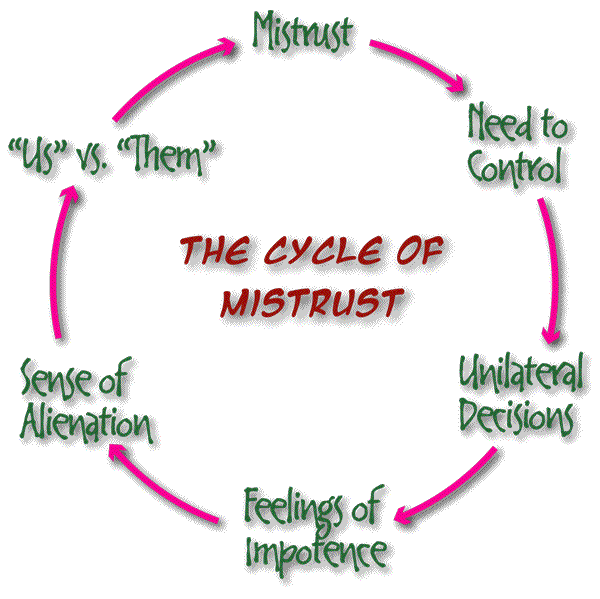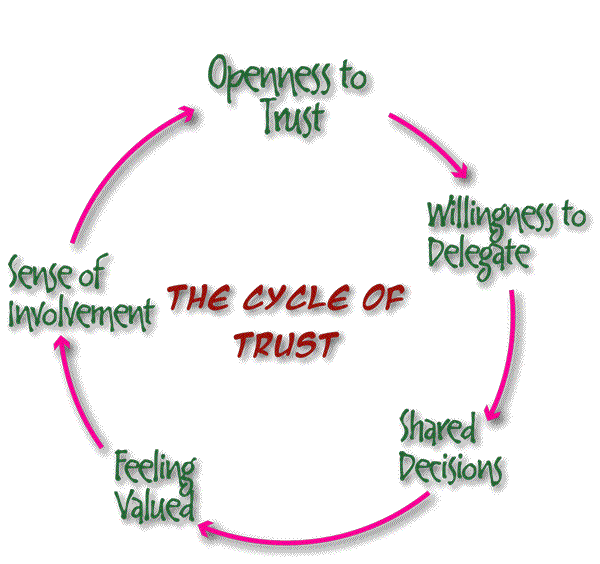Monday, June 19, 2020
Mistrust and Trust

I have said before that I think trust is essential both to Slow Leadership and to a civilized workplace. You have only to read a newspaper, or follow the national and international news, to reach the conclusion that trust is a scarce commodity today in public and commercial life. This lack sets up a negative cycle that produces many of the ills that afflict business and society throughout the developed world.
Imagine a workplace where mistrust is the natural starting point. Since leaders do not trust their subordinates, they feel that they need to control their activities closely. When they delegate work, it will be accompanied by close instructions and followed up by equally close supervision. It’s unlikely that the subordinate will be given any information beyond what is essential to complete their specific tasks. Nor will he or she be permitted to make independent decisions on anything of importance, even if it closely affects their own job.
When bosses don’t trust subordinates to make decisions, they make the decisions themselves. How does this feel to the subordinate? Will he or she feel a valued and important member of the team? Isn’t if far more likely to produce feelings of impotence? If you see key choices about what you’re told is your personal area of responsibility being made by someone else, what can it tell you except that you are judged to be too incompetent, or too untrustworthy, to make them yourself?
Employees who feel impotent and devalued are quickly alienated from the organization of which they’re a part. No amount of fine words about “people are our greatest asset” will change this. Faced with a choice between believing what they hear or what they experience, people trust their experience every time. What they know is that there’s a group of people similar to themselves (“us”), who are treated as having little value beyond their ability to follow orders passed down from above (by “them”).
The inevitable result is to create sharp divisions and heighten feelings of mistrust. Executives stereotype their subordinates, treating them much like awkward, disaffected and difficult teenagers. The employees view their bosses like domineering parents, always ready to interfere with sharp criticism and harsh injunctions to do as they’re told. Bosses believe subordinates have no ideas or sense of initiative, rarely considering the possibility that their actions have convinced staff neither are wanted. Employees are convinced that their leaders are power-crazed martinets, who enjoy nothing better than making themselves look good at other people’s expense. In such an environment, mistrust grows steadily. The negative cycle continues without end.

It does not have to be like this. Let’s consider the alternative: a workplace where trust is seen as essential to good management and good business.
Leaders who hold themselves open to trust are quick to delegate. What’s more, they delegate fully and include decisions of real importance, believing it’s their job to help coach their subordinates to the point where they’re fully capable of handling just about all the decisions that most closely affect their jobs. Decisions are always shared, even where the leaders still makes the final determination.
As a result, people experience being valued and trusted. They know they’re important to the organization, because that’s how they’re treated. They know they’re valuable. And when bosses—and organizations—value their people, employees naturally value them. They feel part of the success of the business because that’s what they know they are—by direct, personal experience, not fine words in some annual report or PR handout. They become part of a community of value. It’s entirely natural that people who feel this way want to do their very best for that community, and contribute not just their labor but their ideas, their creativity, their determination and their commitment far beyond what is written in their contracts.
People who are deeply involved in an enterprise will not willingly see it fail. People who value others find themselves highly valued. Those who trust others are trusted in return. You cannot purchase the results of this cycle of mutual trust, no matter how high the salaries you offer. You cannot produce it by any means save trusting in trust itself and in its power to transform the most superficially unlikely people into colleagues whose contribution will amaze you.
The cycle of mistrust produces outcomes that swiftly reduce the workplace to somewhere people tolerate only so long as they fear unemployment, or can extract material rewards they cannot find elsewhere. The cycle of trust creates the kind of organization where people happily work to their full capacity, sometimes for monetary rewards below those they could find in other jobs. As a leader, it’s your choice which you will make happen.


This work is licensed under a Creative Commons Attribution-NonCommercial-NoDerivs 2.5 License.


